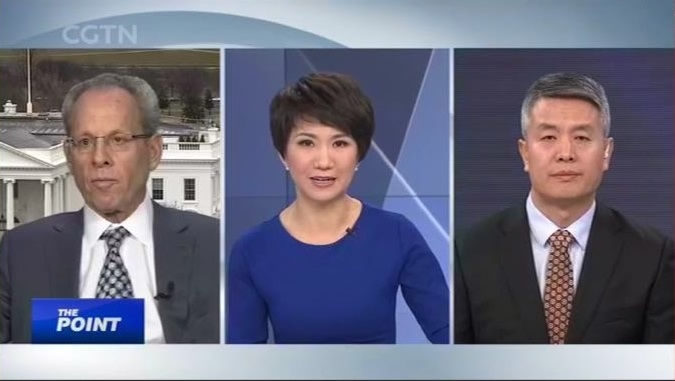By CGTN program “The Point with Liu Xin”
Sino-US relations are seeing signs of warming up after US President Donald Trump changed tack and agreed to honor the one-China policy during a phone call with Chinese President Xi Jinping. This comes just one day after Trump's letter to China, seeking a constructive relationship that benefits both countries. Observers have described it as a positive sign from the White House, and some offer a firm prediction that China and the US won't go to war.
Bilateral ties had become tense in recent weeks, after Trump’s exchange with Taiwan leader Tsai Ing-wen and his questioning of the one-China policy that shifted US recognition from Taiwan's national identity to China in 1979. Trump has also said he wants to pressure Beijing to narrow its trade surplus with the US by threatening to impose a 45 percent tariff on Chinese imports, from the current average of about three percent. As Trump is putting most of his campaign pledges into practice, speculation is running high that he will formally declare China a currency manipulator, which could possibly lead to a trade war with China.

CGTN Photo
Speaking to CGTN’s “The Point with Liu Xin”, Robert Barro, professor of economics at Harvard University and former president of the Western Economic Association, said: “This argument about currency manipulation is basically some kind of legal trick. It has nothing to do with the economic situation."
“The US gets a lot of valuable imports at attractive prices, which is a very positive thing, particularly for poor people in the US. And China is exporting a lot of goods and services that help its production for its economy. It is a little surprising that the bilateral trade deficit has not changed very much ever since the financial crisis in 2008, but I don’t think China is damaging the US in any way with this situation.”
Data from the US Department of Commerce shows Chinese exports to the US grew from a modest 14 billion US dollars in 1989 to almost 500 billion US dollars in 2015. US exports to China grew by considerably less, reaching a peak of 164 billion US dollars in 2014; and the US trade deficit with China has risen to an annual average of well over 300 billion US dollars from 2011-2015.
“Such a trade deficit is mainly caused by the different economic structures of the US and China. US manufacturing only accounts for 15 percent of GDP, but in China this proportion is higher than 40 percent,” said Zhang Jianping, director general of the Center for Regional Cooperation at the Chinese Academy of International and Economic Cooperation.
CGTN Video
But what might a trade war lead to?
According to Capital Economics, the US accounts for about one fifth of China’s exports. A 45 percent tariff could slow China's economy by three percent. But one of China’s leading newspapers, Global Times, warns that Beijing could take a tit-for-tat approach, which would seriously affect orders from Boeing, US auto manufacturers, iPhone sales and US maize and soybean imports.
Apart from China, Trump has also targeted other big US deficit contributors, particularly, Japan, Canada and Mexico. But, says Professor Barro, it is definitely illogical for one country to blame a trading partner for a trade deficit.
CGTN Video









